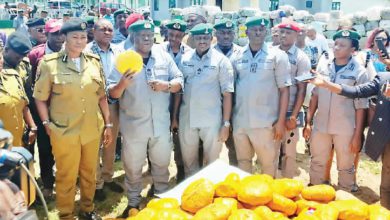- Commercial activities around the border towns declined significantly due to the closure. Although the Federal Government has yet to reopen the borders, smuggling continues to thrive in Katsina and Sokoto states.
Smugglers adopt new tactics as the closure of Nigeria’s borders takes its toll on commercial activities in Katsina and Sokoto border towns, OLAIDE OYELUDE and ADENIYI OLUGBEMI report
when the Federal Government closed down Nigeria’s borders with neighbouring West African countries on August 20 and set up a Special Task Force comprising security personnel drawn from the Army, Air Force, Customs, Immigration and the Department of State Services to check the activities of smugglers, residents of the border communities, traders and transporters had felt the pain
Commercial activities around the border towns declined significantly due to the closure. Although the Federal Government has yet to reopen the borders, smuggling continues to thrive in Katsina and Sokoto states.
Despite the measures put in place by the government to check the influx of contraband goods into the country, those whose lives depend on smuggling in both states seem to have devised new ways of bringing in banned items, especially through the Jibiya and Kongolam borders in Katsina State and the Illela border in Sokoto State.
Smugglers operate under the cover of darkness
Investigation by our correspondent shows that items, such as rice, vegetable oil and second-hand clothes, all of which have been officially classified as contraband, are discreetly smuggled into the country via illegal routes at the border towns under the cover of darkness.
A transporter, who spoke with our correspondent on the condition of anonymity, explained how the smugglers operate on the routes around the Jibiya and Kongolam borders.
He said, “We know the security personnel on those routes. Those ones can easily be compromised. Once they stop us and we settle (bribe) them, they will allow us to go. The problem is when we run into members of the special task force.
“The task force always confiscates our goods. But it does not happen all the time because we have paid agents who keep us informed about the movement of the task force.”In spite of the antics of smugglers, the border closure has affected trading in the Katsina border communities. For example, at the Alhamisi market, which is a walking distance from the Jibiya border, our correspondents observed that commercial activities were at a low ebb last week.
Traders at the market said that had been the situation since government closed the border and thereby prevented foreign goods from getting into the country.
Unlike the past when traders often trooped to the market to purchase imported rice and vegetable oil, not a single person was seen selling bags of rice in the market.
A trader at the market, Awwalu Hamisu, said the closure of the border with Niger Republic had seriously affected the trade in imported rice and some other items disallowed by the government.
Hamisu said, “We only sell what we get. What we get at the market here now are just local grains. For now, there is no foreign rice. If you want to get it, you will have to go to the bush. Sometimes, customs officials and the police also go to the bush to arrest people selling rice there.
A similar scenario was observed at the Sabo Kasua market, also in Jibiya. Gone was the crowded market scenes, the hustle and bustle that often defined commercial activities in the town before the government abruptly shut down the border.
Traders at both border towns, our correspondent discovered, have devised various means of surviving the impact of the closure. Nowadays they connive with transporters to wrap prohibited items in rags and then, carefully conceal them inside vehicles, such as the old Peugeot 504 and Volkswagen Golf station wagon cars.
Some traders also engage the services of commercial motorcyclists to carry the contraband goods to Katsina town and Daura.
Investigation further shows that a 25 kilogramme of imported rice at Jibiya and Daura costs between N12,700 and N12, 800, while the price of a 25 kilogramme of imported vegetable oil is between N9, 100 and N9,300.
In Katsina, a bag of rice sells from N15, 500 to N15,800.The brands of imported rice that were observed to be common in all the places visited were Master gold, Mary gold and Double horse.
Traders don’t sell rice to strangers for fear of arrest
For fear of being arrested by the special task force, whose operatives often disguise as potential customers, many traders at Jibiya and Kongolam, are prepared to deal with only the people they know, especially when the subject revolved around imported rice.
The traders became wary of dealing with unknown faces, it was gathered, following a sudden raid by members of the task force on a warehouse at Gidan Dutsin community two months ago. During the raid, several bales of second -hand clothing worth several millions of naira were impounded by the operatives.
Govt officials in Katsina silent on border closure
The Chairman of the Transitional Council for Jibiya Local Government Area of Katsina State, Haruna Mota, refused to comment on the border closure and its impact on commerce in the state.
Also, the spokesmen for the Nigeria Customs Service, Kaduna/Katsina command, Theophilus Daniya and his colleague at the Nigeria Immigration service, Salisu Iliyasu, refused comment on the same issue.
In his reaction, the Chairman of the Katsina State chapter of the Rice farmers Association of Nigeria, Mallam Shuaibu Wakili, however, commended President Muhamadu Buhari for the closure of the border.
Describing the closure as a blessing to members of the association, Waklili said “ Rice farmers are the happiest farmers in Nigeria now. We sincerely thank President Muhammadu Buhari for the border closure. Our members are recording increase in demands for their crops. Customers now go to their farms to buy rice as against the former practice when they had to beg people to buy our rice. Our rice still goes for N8,500 per bag. It is cheaper, more nutritious and readily available than the foreign rice.”
Many trucks stranded at Illela border
Before the Federal Government’s action, the Illela border in Sokoto State was the preferred route of arms smugglers. Nowadays the reverse is the case as the border closure has effectively checked the activities of the smugglers. Unfortunately it also affected traders and companies, who were going about their legitimate business before the government’s order.
Our correspondents observed that more than 300 trucks belonging to the Dangote Cement Company and 140 others belonging to the Sokoto Cement Company are stranded at the border.
A ‘motor boy’ with the Sokoto Cement Company told our correspondents, on the condition of anonymity, that he had been stranded at the border since its closure.
He said, “The company has recalled all the drivers to Sokoto, leaving us the motor boys to keep the engines running and watch over the trucks till government decides to reopen the border.
“As I am talking with, you some of the trucks will need serious mechanical overhauling to move from where they are parked. Life has been unbearable. The N500 allowance that we were given per two trips has been reduced to N350 since we are not on the road.
“The sad thing about this situation is that the number of trucks stranded here is seriously affecting our distribution chain in Nigeria. It may also affect production.”
Motorcyclists bribe security men
To Commercial motorcycle riders who earn their living through smuggling, the closure of the Illela border has been a bag of mixed feelings. Although they increased their charges recently, most of their earnings are used to ‘settle’ (bribe) security agents on illegal patrol at the bush paths leading from one end of the border to the other.
A commercial motorcyclist, Nura Usman, who conveyed our correspondents from Illela border to Koni in the Niger Republic, said, “The closure of the border is really affecting our business even, as fuel scarcity bites harder at the area.
“To survive, a motorcyclist has to carry five bags of rice at N1,000 each and pay N2,000 at each of the two illegal checkpoints mounted by security personnel on the two routes we follow.
“A litre of fuel at the black market is sold for N320, whereas we used to buy it between N180 and N200 before the border was closed.”
Usman took our correspondent from the Illela border to Koni in Niger Republic through a dusty bush path with two illegal checkpoints one each side. The checkpoints were manned by some operatives of the Nigerian immigrations and Customs Service dressed in T-Shirts. One of the routes passes through Gidan Kamin, Bakin Dutse, Geti, Babadede, Gidan Ketsu, Tabanni to Koni.
The return trip from Koni to Illela was through Gani, Kasheni, Mungankan, Kwadagla, Kesguda and Arab 1 and 2,. The checkpoint was manned by uniformed Police Nationale of Niger Republic.
The Public Relations Officer, Sokoto Area Command of the NCS, Magaji Mailafia, denied the involvement of any customs officer in any form of illegal activities at the Illela border post.
He said, “We have no knowledge of any of our men colluding with economic saboteurs in flouting the Federal Government directives of total land border closure. With our monitoring mechanism, our men are fully committed to the Federal Government directives”.



